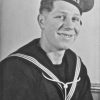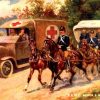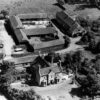3.The Duke's Poetical Chaplain
George Crabbe at Belvoir 1782 - 1785
By Kate Pugh
The Duke’s Poetical Chaplain
While such preferment was more than Crabbe could have dreamt of in his days of penury, he seems to have felt some discomfort about his uncertain social status: ‘He always seemed to shrink from going into details on the subject… the situation he filled at Belvoir was attended with many painful circumstances, and productive in his mind of some of the acutest sensations of wounded pride that have ever been traced by any pen.‘(1) Although the Duke appears to have treated Crabbe with kindness and respect, the servants seem to have ridiculed him and he could not have felt at ease amongst the wealthy and powerful men and women who were often guests and in whose sports and pastimes he could not take part.
Crabbe’s son suggested that life at the castle ‘could not but have been oppressive to a person of Mr Crabbe’s education and disposition… Mr Crabbe could never conceal his feelings and he felt strongly…nor, perhaps, did he at all times put a bridle on his tongue, for he might feel the riches of his intellect more than the poverty of his station … brought up in the warehouse at Slaughden ….he may at that early period have retained some repulsive marks of the degree from whence he had so lately risen.'(2)
Political, as well as social differences, may also have caused problems. In spite of this, Crabbe formed a friendship with Robert Thoroton. who was the Duke’s secretary and father of John Thoroton, Rector of Bottesford, the most valuable rectory in the Duke’s gift. In London, during a visit to the theatre, for which Crabbe had a great enthusiasm, ‘Being one night introduced by Mr Thoroton into the box of the Prince of Wales’s equerries, his royal highness enquired with some displeasure, who he was that had so intruded there, but hearing that it was the poetical chaplain of his friend the Duke of Rutland…Mr Crabbe was presented to his royal highness by his noble patron.’ (3)
The Patron
Biographers have suggested that Crabbe’s social discomfort at Belvoir is reflected in some of his poems, particularly The Patron.(Tales 1812) His son refers to: ‘The numberless allusions to the nature of a literary dependant’s existence in a great lord’s house, which occur in my father’s writings, and especially in the tale of The Patron’ :
‘And now arriving at the hall, he tried
For air composed, serene and satisfied
As he had practiced in his room alone
And there acquired a free and easy tone:
There he had said, ‘Whatever the degree
A man obtains, what more than man is he?’
And when arrives – ‘This room is but a room …
When he his lordship and the lady saw,
Brave as he was, he felt oppressed with awe; .
Cold Charities
Perhaps prompted to a kind of defiance by this sense of social inferiority, Crabbe completed The Village, a radical poem which sought to correct the idealized version of rural life that was popular in poems like Goldsmith’s, The Deserted Village:
‘I grant indeed that fields and flocks have charms
For him that grazes or for him that farms;
But when amid such pleasing scenes I trace
The poor, laborious natives of the place …
Then shall I dare these real ills to hide
In tinsel trappings of poetic pride?’
The Village, with minor corrections by Dr Johnson, who praised it to Reynolds as ‘original, vigorous, and elegant’, was published in May 1783. It was a success. Boswell said, ‘the sentiments of Mr Crabbe’s admirable poem, as to the false notions of rustic happiness and rustic virtue, were quite congenial with Dr Johnson’s own..‘ (4) It is Crabbe’s most frequently quoted poem, often used as evidence of the hardships of rural life at the time of the enclosures. How closely it relates to the conditions Crabbe saw in the Vale of Belvoir is not clear.
It has been argued that the effects of the enclosures in Bottesford and Muston were mitigated by the charities established by the Manners family and others. The Duke built cottages and allocated land at low rent to compensate labourers for the loss of grazing rights.(5) Nonetheless, the area must have been affected by the agricultural depressions of the late C18th and early C19th or the rising prices during the Napoleonic wars. Although wages rose, prices more than doubled.
‘Where Plenty smiles – alas! she smiles for few-
And those who who taste not, yet behold her store,
Are as the slaves that dig the golden ore,
The wealth around them makes them doubly poor.’
Bottesford certainly had its own workhouse until 1828, and by the 1830s the situation was so serious that the Parish was paying people to emigrate. Things cannot have been very different a mile away in Muston, but Crabbe could equally be remembering his earlier days in Suffolk:
‘Theirs is yon house that holds the parish poor,
Whose walls of mud scarce bear the broken door
There, where the putrid vapours, flagging, play
And the dull wheel hums doleful through the day ;-
There children dwell who know no parents’ care;
Parents, who know no children’s love, dwell there!…
Dejected widows with unheeded tears,
And crippled age …
Here, sorrowing, they each kindred sorrow scan,
And the cold charities of man to man:’
However, the tensions inherent in Crabbe’s situation are evident in the poem. Much of it is concerned to convey ‘the real picture of the poor’ who ‘plod behind the plough’, but the end becomes a panegyric to Robert Manners, brother to the Duke, an officer on the Resolution, who died after a naval engagement off St Kitts:
‘And you, ye poor, who still lament your fate
Forbear to envy those you call the great;
….then let your murmurs cease
Think, think of him, and take your lot in peace.’
Lord Robert Manners’ tomb can be seen in Bottesford church with the inscription arranged by Crabbe: ‘appointed to the command of a LXXIV gun ship, The Resolution; in which, after distinguishing himself in nine different actions, and living to see victory in the last, on the XII of April MDCCLXXXII, he fell, covered in wounds in the service of his country: twenty four years, three months, and seventeen days being the short period assigned to his life; yet a period sufficiently long, to render his name immortal! That finished, he expired with all the philosophy which distinguished the Roman; and all the piety and resignation which alone characterize the Christian.’
Marriage
Whatever the drawbacks of Crabbe’s situation at Belvoir, it at least enabled him in 1783 to marry his fiancée Sarah Elmy at last. They had comfortable quarters in the castle that existed before the rebuilding of 1801 – 1830, but in 1784 Pitt made the Duke of Rutland Viceroy of Ireland. Crabbe did not accompany the Duke to Ireland. Without his patron to appreciate his work and protect him from the ridicule of the servants, he became even more ill at ease in the Castle. Added to this discomfort was a greater sorrow. In 1784 the Crabbes’ first child, a son christened George, was born at Belvoir, but died when only a few hours old.
Crabbe’s remarkable social ascent from the dilapidated cottage at Slaughden to a Ducal Castle left him yearning for something humbler;
‘Oh! had I but a little hut
That I might hide my head in…’
References
(1) Life p. 108
(2) ibid p. 121
(3) ibid p. 119
(4) quoted in Life p. 113
(5) Honeybone p. 88



















No Comments
Add a comment about this page